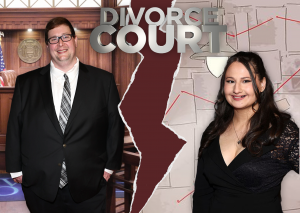In my 23 years of life, I have never met anyone with my name.
I don’t have a problem with it. My name is unique, and according to my parents, even in Mexico, they didn’t know too many Hernans.
They have always introduced me by the proper pronunciation of my name — “Air-naan” — never shying away from the most obvious thing about it: We are not from here.
While I was born in the States, growing up, I neither felt Mexican nor American. This lack of identity isn’t unique to me, as many other first-generation Hispanics struggle with belonging.
Somewhere along the line, I began to anglicize the pronunciation of my name. There is a very subtle rolling of the single “r” in my name that makes it difficult for most people to say. I started introducing myself as “Her-non,” in order to make it easier for others to pronounce.
Maybe it was a subconscious attempt to sound less foreign, but I honestly don’t know how or why I started introducing myself improperly.
As both a first-generation student and first-generation Hispanic about to venture off into the “real world,” I am beginning to see how disconnected I have become from my culture.
Over the course of being at college, my spoken Spanish has fallen out of touch, and my written Spanish skills have never been up to par with people who have spoken it their whole lives.
So it falls back to my name and appearance to connect me with my roots.
Part of the reason I wanted to become a journalist is because there is a lack of brown faces in the media. Growing up, I never had people I could look up to who looked like me whenever I tuned in to the news on TV.
How could I possibly serve as a representation of my culture when I am afraid of pronouncing my own name correctly?
This goes beyond the pronunciation of my name. Far too often, I find myself using a “white” name — Henry is my default for whatever reason — in order to not feel like I am inconveniencing service workers taking my order.
In high school, whenever a substitute teacher was taking attendance, my classmates were all prepared for the butchering of my name. Common mispronunciations included “Her-nin,” and “Her-nAn.” Sometimes I even got “Herman.” Friends in my classes were always quick to correct them in my defense, so I didn’t have to.
In college, on syllabus day of any class, I always winced a bit whenever I knew my name was coming up. I always responded with an unenthusiastic “It’s ‘Air-naan,’ but yeah, I’m here.”
To be clear, I am not embarrassed by my name. However, for most of my life, I focused on making my existence convenient for others.
I understand that much of this falls back on my own journey to understand my worth, and thankfully this year I have made immense strides in that part of my life.
Comedian Hasan Minhaj put it the best when he explained on “Ellen” in April of 2019: If people can learn how to pronounce Timothée Chalamet or Ansel Elgort, they can learn to pronounce our names as well.
While Minhaj and I don’t share the same cultural background, he has taught me to no longer make accommodations for white people when it comes to my name.
“I’m trying to live,” Minhaj later said about his time on the talk show. “So, I’m going to go on ‘Ellen’ — the most American show ever — and I’m going to make you hit all the syllables.”
Moving forward, as I enter the “real world,” I am making a commitment to myself to properly introduce myself; my name isn’t an inconvenience to learn.




